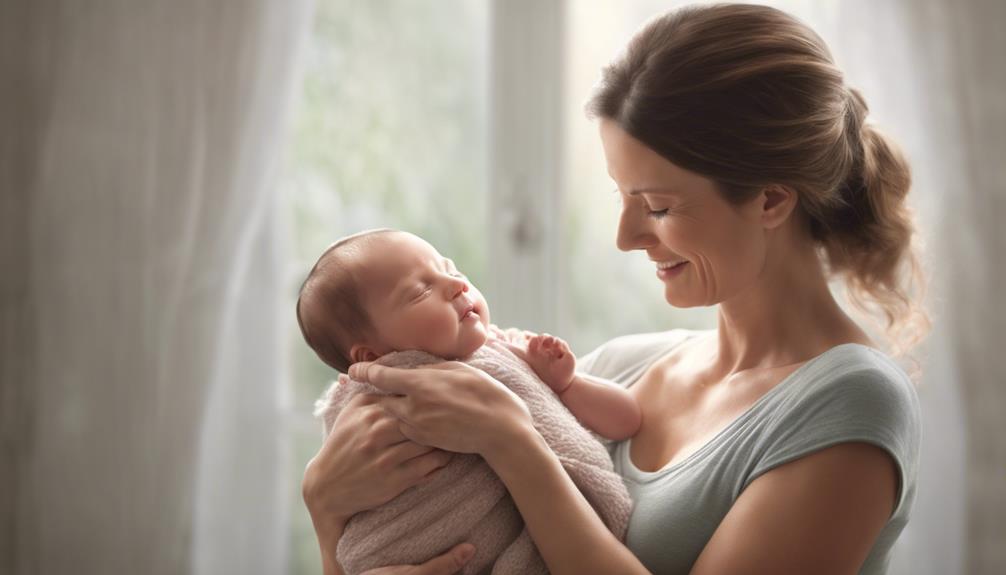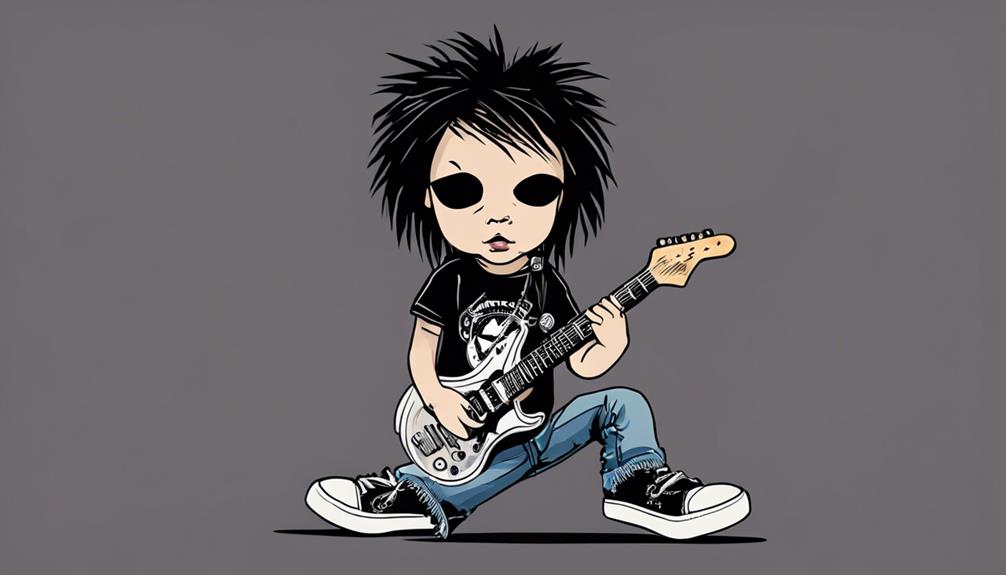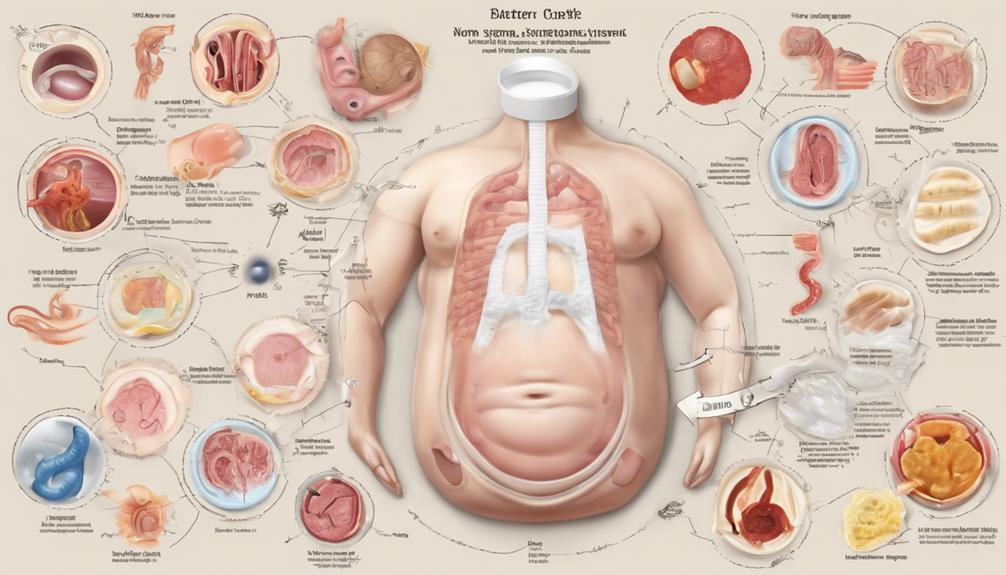If you've ever felt uncertain about how to handle your newborn's hiccups, rest assured that there are simple and effective ways to provide relief.
By implementing a few gentle techniques, you can help ease your baby's discomfort and promote a sense of calm.
Stay tuned to discover practical strategies that can make a difference for your little one's hiccups.
Key Takeaways
- Burping techniques help release trapped air and reduce newborn hiccups.
- Pacifiers can soothe and shorten the duration of hiccups in infants.
- Positional changes, like holding upright post-feeding, aid in minimizing hiccups.
- Prevention tips include frequent burping, smaller feedings, and keeping baby upright for digestion.
Understanding Newborn Hiccups
If you've ever wondered about the mysterious phenomenon of newborn hiccups, let's investigate understanding their cause and significance. Newborn hiccups occur due to the rapid opening and closing of their vocal cords, which is triggered by the diaphragm. This natural reflex is a sign of normal development and health in infants. These hiccups typically resolve on their own within 5 to 10 minutes, so there's usually no need to worry.
To help manage or prevent newborn hiccups, incorporating burping into feeding routines can be beneficial. Burping helps release excess gas that could contribute to hiccups. Additionally, creating a calm feeding environment and using proper feeding techniques can reduce the frequency of hiccups in newborns. Remember, newborn hiccups are a common occurrence and are generally nothing to be concerned about. Just stay attentive to your baby's needs and enjoy these precious moments together.
Burping Techniques for Relief

When it comes to managing newborn hiccups, mastering effective burping techniques is key to providing relief for your little one. Burping helps release trapped air in the stomach, a common culprit of those pesky hiccups. Remember to burp your baby during and after feedings to prevent hiccups from occurring.
For bottle-fed babies, burp them every 2-3 ounces, while breastfed babies should be burped when switching between breasts. By incorporating proper burping techniques into your routine, you can greatly reduce the frequency of hiccups in your newborn.
Consistent burping not only helps in reducing the occurrence of hiccups but also prevents discomfort and interruptions caused by these sudden episodes. So, make sure to pay attention to burping your little one to keep those hiccups at bay and guarantee a more comfortable feeding experience for both of you.
Pacifier Soothing Method
To help calm your newborn's hiccups, contemplate utilizing the pacifier soothing method as a gentle and effective way to provide relief. The sucking action on a pacifier can help relax the diaphragm, potentially stopping the hiccups. Additionally, sucking on a pacifier may distract your baby from the hiccups, aiding in calming them down.
Here are some key points to contemplate when using a pacifier to soothe your newborn's hiccups:
- Utilizing a pacifier can provide comfort and soothing sensations, potentially reducing the duration of hiccups.
- The sucking action on a pacifier can help regulate breathing patterns, assisting in resolving hiccups.
- Pacifiers are a safe and commonly used method to help manage and alleviate newborn hiccups.
Positional Changes for Comfort

Consider adjusting the baby's position to provide comfort and help alleviate hiccups. Holding your little one upright after feeding can reduce pressure on the diaphragm, aiding in releasing trapped air and minimizing hiccups.
Placing the baby in a gentle upright or slightly inclined position during and after meals can also promote better digestion and reduce the chances of hiccups. Avoid laying your baby flat immediately after feeding to prevent regurgitation of stomach contents, which can trigger hiccups.
Using a baby carrier or infant seat to keep your baby in an upright position post-feeding may help reduce hiccups by allowing for better digestion and airflow. These simple positional changes can go a long way in providing comfort for your baby and minimizing hiccups, ensuring a more peaceful experience for both of you.
Prevention Tips for Future Episodes

To prevent future episodes of hiccups in your newborn, remember to burp your baby frequently during feedings to minimize excess air intake. Offering smaller, more frequent feedings can also help reduce the likelihood of hiccups occurring.
Keeping your baby upright for about 20-30 minutes after feeding aids in digestion and can minimize hiccups by allowing food to settle properly. Using a slow-flow nipple for bottle feeding is another effective way to prevent the baby from swallowing air, which can trigger hiccups.
Avoid overstimulating or overfeeding your baby, as these factors can contribute to the occurrence of hiccups. By being mindful of these simple steps in your baby's feeding routine, you can help minimize the chances of them experiencing uncomfortable hiccups.
Your baby's well-being is a top priority, and these preventative measures can make a difference in their comfort and overall feeding experience.
Frequently Asked Questions
How Do You Get Rid of Hiccups for Newborns Fast?
To get rid of hiccups for newborns fast, try burping them during and after feeding, offer a pacifier for relaxation, change their position to upright, gently rub their back to release air bubbles, and avoid adult remedies.
Is It OK to Lay Baby Down With Hiccups?
It's generally safe to lay your baby down with hiccups. They usually don't affect sleep. Hiccups naturally resolve. It's okay to monitor comfort but hiccups alone don't need you to keep them upright.
What Is the Best Position for Baby Hiccups?
When it comes to baby hiccups, the best position is upright or slightly inclined to aid digestion and ease pressure on the diaphragm. Keeping your little one calm, avoiding sudden movements, and gently patting their back can help ease hiccups quickly.
What Stops Hiccups Quickly?
You stop hiccups quickly by trying various techniques. Burping, offering a pacifier, changing positions, and gently rubbing the back can aid in relieving hiccups. Avoid adult remedies and focus on soothing methods to ease the discomfort.
Conclusion
Next time your little one has hiccups, remember these quick tips to bring them relief.
Just like a gentle breeze can calm a storm, simple techniques like burping, using a pacifier, and keeping your baby upright can help settle those hiccups in no time.
With a little patience and practice, you'll be a pro at soothing your newborn's hiccups.










